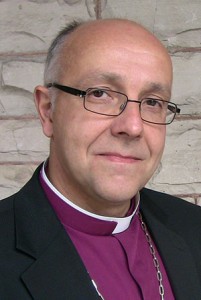 GERMANY – A year ago today, Bishop Hans-Jörg Voigt of the Independent Evangelical Lutheran Church (SELK) in Germany released a pastoral letter entitled “Discovering Marriage and Family as Gifts of God.” Its July 2 publication coincided with German observances of the Visitation of Mary to her cousin Elizabeth (Luke 1:39-56)—an appropriate day to consider the blessings of marriage and children.
GERMANY – A year ago today, Bishop Hans-Jörg Voigt of the Independent Evangelical Lutheran Church (SELK) in Germany released a pastoral letter entitled “Discovering Marriage and Family as Gifts of God.” Its July 2 publication coincided with German observances of the Visitation of Mary to her cousin Elizabeth (Luke 1:39-56)—an appropriate day to consider the blessings of marriage and children.
The letter came in the midst of turmoil in Germany, following the publication of a reference paper on marriage by the Evangelical Church in Germany (EKD). The EKD paper—entitled “Between Autonomy and Dependence—Strengthening the Family as a Reliable Community”—was widely criticized, both by other Christians and in the German press, for abandoning a traditional biblical understanding of marriage.
Bishop Voigt’s letter, by contrast, was widely praised. Bishop Wolfang Ipolt of the Roman Catholic Diocese of Görlitz was one of those who hailed its publication. “Given the irritation caused within the Catholic Church by the EKD’s guidance on the subject of marriage and family,” he wrote, “the pastoral letter of the Bishop of SELK is for Catholics a positive sign from Evangelical Christianity. Especially when it comes to the important area of marriage and family, Christians of different denominations must stand together and not lightly abandon the testimony of Scripture.”
In addition to serving as head of SELK, Bishop Voigt is Chairman of the International Lutheran Council (ILC). His letter, which presents the case for a biblical understanding of marriage and family in clear, positive language, is now available in English, thanks to a translation by Rev. Charles Schaum.
“Hardly a day passes by currently in which basic questions regarding marriage, family, and sexuality are not dealt with in the public sphere of our western society,” Bishop Voigt’s letter begins. “Uncertainty has now reached even the internal sphere of the Church. With this pastoral letter I would remind you of the foundations of Holy Scripture and the confession of the Church concerning the area of questions on marriage and family.”
“Hardly a day passes by currently in which basic questions regarding marriage, family, and sexuality are not dealt with in the public sphere of our western society.”
“In light of all this uncertainty,” he continues, “I am writing this pastoral message especially to offer encouragement to young people, that they might get married and start a family.”
Throughout the letter, Bishop Voigt discusses the desire young people have to start their own families. To that end, he encourages young adults not to let concerns in this world—extended periods of education, temporary employment arrangements, a desire for greater mobility, and so forth—prevent them from entering into marriage and raising children.
Bishop Voigt also calls on the wider Church to demonstrate love and care for young families, so that they are not overwhelmed by the challenges rearing a family brings in contemporary western society. “Congregations can become a place where older people help younger families with their child-rearing tasks,” he writes. Noting especially the difficulties single parents face, he writes that “the Church is required in a special manner to stand helpfully in allegiance with them.”
This is a truly biblical and Christian model of marriage and family, Bishop Voigt explains. “The words of Jesus and the explanations of the Apostle Paul allow no doubt that the New Testament recognizes no other models for life than marriage and family on the one hand and celibacy—which is a special spiritual gift—on the other. Consequently, alternative models of marital relationship—including polygamy and homosexuality—must be rejected. But this does not condone the mistreatment of people who subscribe to such models. “It is a fruit and consequence of the winsome love of Christ,” Bishop Voigt writes, that the Church must treat “people with same-sex inclinations with respect and love, and additionally stand against discrimination against them.”
Download the full letter in English here. The letter can also be read in German at SELK’s website here.
———————
